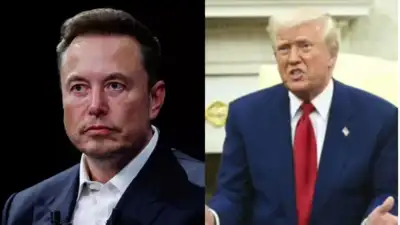As political tensions flare, experts warn that Elon Musk’s empire, built on public funding, could face steep fallout. At the intersection of ambition and politics, Elon Musk’s multibillion-dollar space and electric vehicle empire may soon be at the mercy of President Donald Trump. Despite being a vocal critic of government subsidies, Musk’s companies—SpaceX and Tesla—have long depended on them. And now, Trump’s public feud with the billionaire threatens to upend a financial relationship that has fuelled some of the most significant technological advances in America’s recent history.An in-depth investigation by The Washington Post revealed that Musk’s ventures have received at least $38 billion in government contracts, subsidies, loans and tax credits, much of it in just the past five years. That includes at least $6.3 billion pledged in 2024 alone. Tesla and SpaceX—two of the world’s most prominent tech companies—have not only thrived on this backing but, in many cases, owe their very survival to it.With Trump threatening to slash federal support over their growing differences, the question now being asked in Washington and Wall Street alike is: Could he actually destroy Musk’s business empire?Built on billions: The scale of public supportTesla’s journey from a cash-strapped start-up to the world’s leading EV manufacturer has been paved with government help. According to The Post, a $465 million low-interest loan from the Department of Energy in 2010 allowed Tesla to engineer its flagship Model S and purchase a major California factory. The company repaid the loan by 2013, but not before it became central to Tesla’s survival and eventual IPO.In total, Tesla has earned $11.4 billion in regulatory credits from federal and state programs incentivising zero-emission vehicles—enough to offset years of operating losses. As The New York Times notes, those credits were instrumental in turning Tesla’s first annual profit in 2020. Without them, the company would have reported a loss of $718 million.Meanwhile, SpaceX has grown into the most vital contractor in America’s space program. NASA alone has invested nearly $15 billion in the company, which now operates the only crew and cargo transport to the International Space Station. The Pentagon and US intelligence agencies have also poured billions into SpaceX launches and secure satellite deployments.Under a $5 billion contract, SpaceX’s Dragon capsule remains the only American vehicle capable of crewed missions to the ISS. Musk’s threat—and Trump’s counter of potential contract terminations—now raises alarms about how political retaliation could upend US space programs. NASA press secretary Bethany Stevens told Reuters, “We will continue to work with our industry partners to ensure the president’s objectives in space are met.”Trump’s leverage: Political feud meets financial powerAs the relationship between Musk and Trump deteriorates, so do the prospects for continued public support. Trump has already proposed slashing key tax credits and subsidies, including the $7,500 consumer EV credit. According to analysts at JPMorgan, this could cost Tesla $1.2 billion in annual profit.Worse still, The New York Times reports that Trump has publicly threatened to cancel federal contracts to Musk’s companies. While that might seem unlikely given SpaceX’s dominant position, experts warn it’s not out of the question.As Ars Technica reports, such a move could set back the US space program by a decade. SpaceX is currently the only provider of crewed space flights for NASA and is contracted to safely de-orbit the International Space Station in 2030. It is also critical to America’s Moon mission via NASA’s Artemis program.While SpaceX’s market dominance may buffer it from complete collapse, analysts say the damage would still be immense.“It fortunately wouldn’t be catastrophic… but there’s no question that it would result in significant lost revenue and missed contract opportunities,” said Justus Parmar, CEO of SpaceX investor Fortuna Investments, reported Reuters.Former NASA deputy administrator Lori Garver said pulling contracts would likely be illegal. But she warned Musk’s actions were dangerous: “A rogue CEO threatening to decommission spacecraft, putting astronauts’ lives at risk, is untenable.”Regulatory chokehold: How else Trump could strikeEven without tearing up contracts, Trump could take a more insidious route: the regulatory bottleneck. As Ars Technica notes, agencies like the Federal Aviation Administration (FAA) and the National Highway Traffic Safety Administration (NHTSA) could slow or stall key Musk projects.The FAA could restrict Starship launch expansions, while NHTSA could ramp up scrutiny of Tesla’s Full Self Driving and Autopilot features—putting product development at risk.These tools are under Trump’s executive branch influence and could be weaponised without needing Congressional approval. “If the Trump government does in its feud with Musk is attack his financial interests,” said Paul Levinson, a professor at Fordham University, “Musk is very likely to not only survive but continue to thrive. But regulatory delays could reshape timelines and margins.”‘We earned that’: Musk’s companies respondDespite the heavy reliance on public funding, Musk and his executives have defended their role in serving government interests. “We earned that,” SpaceX President Gwynne Shotwell said recently of federal contracts, pointing to the company’s track record in cutting costs and delivering results.Indeed, many in Washington see Musk’s ventures as having advanced key US goals—from decarbonising transport to dominating low-Earth orbit. “NASA is working with partners like SpaceX… for the benefit of all,” said NASA spokeswoman Cheryl Warner.Still, the contrast between Musk’s anti-subsidy rhetoric and the billions his companies receive hasn’t gone unnoticed. Yale professor Jeffrey Sonnenfeld told The Post, “With DOGE [Department of Government Efficiency], there does seem to be a paradox there. He has been a big beneficiary of national industrial policy.”Can Musk survive without Washington?In the short term, the answer is: possibly. Tesla has repaid loans and now generates billions in profit. SpaceX’s commercial Starlink service is booming. But long-term survival without government support is far less certain—particularly in the face of regulatory headwinds or a cancelled lunar contract.“Elon Musk is undeniably the architect of his empire,” said George Washington University’s John Helveston to NPR. “But government scaffolding helped build the skyscraper. If Trump starts pulling pieces out, the whole thing doesn’t collapse—but it shakes.”For now, Musk appears publicly defiant. But behind closed doors in Washington and Silicon Valley, the calculations are more cautious. The fate of America’s most iconic tech visionary may yet hinge on politics more than engineering.












